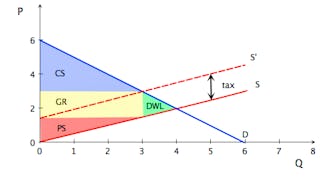Wir treffen jeden Tag wirtschaftliche Entscheidungen: was wir kaufen, ob wir arbeiten oder spielen, was wir studieren. Wir reagieren ständig auf die Märkte: Preise beeinflussen unsere Entscheidungen, Märkte signalisieren, wo wir uns anstrengen sollen, sie leiten Unternehmen dazu an, bestimmte Güter eher zu produzieren als andere. Wirtschaft ist überall um uns herum.



(1,599 Bewertungen)
Kompetenzen, die Sie erwerben
- Kategorie: Wirtschaft
- Kategorie: Entscheidungsfindung
- Kategorie: Verbraucherverhalten
- Kategorie: Marktanalyse
- Kategorie: Angebot und Nachfrage
- Kategorie: Steuer
- Kategorie: Politische Analyse
- Kategorie: Marktdynamik
- Kategorie: Ressourcen-Zuweisung
Wichtige Details

Zu Ihrem LinkedIn-Profil hinzufügen
18 Aufgaben
Erfahren Sie, wie Mitarbeiter führender Unternehmen gefragte Kompetenzen erwerben.


Erwerben Sie ein Karrierezertifikat.
Fügen Sie diese Qualifikation zur Ihrem LinkedIn-Profil oder Ihrem Lebenslauf hinzu.
Teilen Sie es in den sozialen Medien und in Ihrer Leistungsbeurteilung.

In diesem Kurs gibt es 5 Module
Woher kommen die Märkte? Wir beginnen mit dem Verständnis der Knappheit, mit der wir konfrontiert sind, und dem Konzept der Opportunitätskosten, das die wahren Kosten jeder Entscheidung, die wir treffen, widerspiegelt. Wir werden lernen, Knappheit mit Hilfe der Produktionsmöglichkeitsgrenze zu modellieren, die es uns ermöglicht, Kompromisse zu visualisieren und zwischen effizienten, ineffizienten und unerreichbaren Punkten zu unterscheiden. Wir werden auch erörtern, wie sich das Wirtschaftswachstum auf unsere Möglichkeiten auswirkt und uns ermöglicht, das bisher Unerreichbare zu erreichen.
Das ist alles enthalten
17 Videos2 Lektüren3 Aufgaben1 Diskussionsthema
Der Handel ermöglicht es uns, das Unerreichbare zu erreichen - wir können mehr konsumieren als wir selbst produzieren können. Wir werden das Konzept des komparativen Vorteils einführen und erörtern, wie die Gewinne aus der Spezialisierung es uns ermöglichen, unsere Ressourcen effizient zu nutzen. Wir werden diese Konzepte auf ein einfaches Handelsmodell anwenden und zeigen, dass die Konsumwahrscheinlichkeitsgrenze nun Punkte außerhalb der Produktionswahrscheinlichkeitsgrenze zulässt.
Das ist alles enthalten
14 Videos1 Lektüre2 Aufgaben1 Diskussionsthema
Wir werden das zentrale Modell von Angebot und Nachfrage vorstellen. Dies wird Ihnen ermöglichen, mit anderen Wirtschaftswissenschaftlern zu kommunizieren und endlich diese Wirtschaftsseiten und Marktupdates zu verstehen. Wir werden zwischen einer Bewegung entlang und einer Bewegung der Angebots- und Nachfragekurven unterscheiden. Wir werden Marktgleichgewicht definieren und verstehen, dass es bei einem Gleichgewichtspreis weder einen Nachfrage- noch einen Angebotsüberhang gibt. Zum Schluss werden wir einige Szenarien durchspielen, in denen exogene Veränderungen das Angebot und/oder die Nachfrage beeinflussen und die Auswirkungen auf den Gleichgewichtspreis und die Menge analysieren.
Das ist alles enthalten
15 Videos1 Lektüre4 Aufgaben1 Diskussionsthema
Diese Woche gibt es eine Menge Terminologie. Wir werden das Konzept der Nachfrageelastizität einführen, das die Reaktion der nachgefragten Menge auf eine Änderung des Preises einer Ware misst. Wir werden uns mit der Beziehung zwischen Preisänderungen und Einnahmen oder Verkäufen befassen und untersuchen, wie Elastizitäten uns dabei helfen können, vorherzusagen, ob eine Preissenkung zu höheren oder niedrigeren Einnahmen führt. Anschließend stellen wir weitere wichtige Elastizitäten vor: Kreuzpreiselastizität, Einkommenselastizität und Angebotselastizität. Wir beenden die Woche, indem wir die große Errungenschaft der Märkte erkunden: die Maximierung der Größe des Kuchens oder des Gesamtnutzens für die Gesellschaft.
Das ist alles enthalten
23 Videos1 Lektüre4 Aufgaben1 Diskussionsthema
In Woche vier haben wir gelernt, dass die Märkte den Überschuss, der erzielt werden kann, maximieren. Was passiert also, wenn die Regierung in den Markt eingreift? Diese Woche werden wir Preisunter- und -obergrenzen, Steuern und Subventionen analysieren und lernen, wie die besten Absichten manchmal zu sehr unglücklichen Ergebnissen führen.
Das ist alles enthalten
16 Videos1 Lektüre5 Aufgaben1 Diskussionsthema
Dozent

Mehr von Wirtschaft entdecken


O.P. Jindal Global University


University of Pennsylvania


University of Illinois Urbana-Champaign


Rice University
Warum entscheiden sich Menschen für Coursera für ihre Karriere?




Bewertungen von Lernenden
1.599 Bewertungen
- 5 stars
79,25 %
- 4 stars
17,31 %
- 3 stars
2,62 %
- 2 stars
0,43 %
- 1 star
0,37 %
Zeigt 3 von 1599 an
Geprüft am 13. Jan. 2017
I really enjoyed the clarity with which the concepts were taught. I loved the examples and I thought they were very helpful and made the concepts so much easier to understand.
Geprüft am 16. Mai 2020
The information I gained during this course will surely help me in becoming a better economist in the future and I found all the concepts quite easy as they were explained very well.
Geprüft am 9. Feb. 2018
Nice introductory course for microeconomics. Course provides simple and easy explanations for demand and supply, elasticity, effects of tax and subsidies on market.

Neue Karrieremöglichkeiten mit Coursera Plus
Unbegrenzter Zugang zu 10,000+ Weltklasse-Kursen, praktischen Projekten und berufsqualifizierenden Zertifikatsprogrammen - alles in Ihrem Abonnement enthalten
Bringen Sie Ihre Karriere mit einem Online-Abschluss voran.
Erwerben Sie einen Abschluss von erstklassigen Universitäten – 100 % online
Schließen Sie sich mehr als 3.400 Unternehmen in aller Welt an, die sich für Coursera for Business entschieden haben.
Schulen Sie Ihre Mitarbeiter*innen, um sich in der digitalen Wirtschaft zu behaupten.
Häufig gestellte Fragen
Der Zugang zu Vorlesungen und Aufgaben hängt von der Art Ihrer Einschreibung ab. Wenn Sie einen Kurs im Prüfungsmodus belegen, können Sie die meisten Kursmaterialien kostenlos einsehen. Um auf benotete Aufgaben zuzugreifen und ein Zertifikat zu erwerben, müssen Sie die Zertifikatserfahrung während oder nach Ihrer Prüfung erwerben. Wenn Sie die Prüfungsoption nicht sehen:
Der Kurs bietet möglicherweise keine Prüfungsoption. Sie können stattdessen eine kostenlose Testversion ausprobieren oder finanzielle Unterstützung beantragen.
Der Kurs bietet möglicherweise stattdessen die Option 'Vollständiger Kurs, kein Zertifikat'. Mit dieser Option können Sie alle Kursmaterialien einsehen, die erforderlichen Bewertungen abgeben und eine Abschlussnote erhalten. Dies bedeutet auch, dass Sie kein Zertifikat erwerben können.
Wenn Sie ein Zertifikat erwerben, erhalten Sie Zugang zu allen Kursmaterialien, einschließlich der benoteten Aufgaben. Nach Abschluss des Kurses wird Ihr elektronisches Zertifikat zu Ihrer Erfolgsseite hinzugefügt - von dort aus können Sie Ihr Zertifikat ausdrucken oder zu Ihrem LinkedIn-Profil hinzufügen. Wenn Sie die Kursinhalte nur lesen und ansehen möchten, können Sie den Kurs kostenlos besuchen.
Sie haben Anspruch auf eine vollständige Rückerstattung bis zwei Wochen nach Ihrem Zahlungsdatum oder (bei Kursen, die gerade erst begonnen haben) bis zwei Wochen nach Beginn der ersten Sitzung des Kurses, je nachdem, welcher Zeitpunkt später liegt. Sie können keine Rückerstattung erhalten, sobald Sie ein Kurszertifikat erworben haben, auch wenn Sie den Kurs innerhalb der zweiwöchigen Rückerstattungsfrist abschließen. Siehe unsere vollständigen Rückerstattungsbedingungen.
Weitere Fragen
Finanzielle Unterstützung verfügbar,
 enthalten
enthalten
